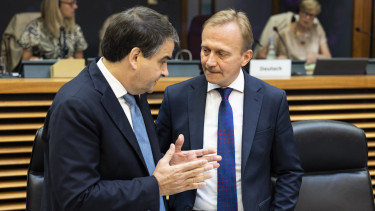European Commission President talks about shaping Europe's digital future

I am a tech optimist. My belief in technology as a force for good comes from my experience as a medical student. I learnt and saw first-hand its ability to change fates, save lives and make mundane what once would have been a miracle.
We now take for granted that we can take an antibiotic when we have an infection or go for an x-ray or MRI scan when we get injured or sick. These are all miracles that have changed the course of humanity for the better.
Thanks to technology, these miracles are becoming more breathtaking and more regular by the day. They are helping to better detect cancer, support high-precision surgery or tailor treatment for the needs of each patient.
This is all happening right now, right here in Europe. But I want this to be only the start. And I want it to become the norm right across our society: from farming to finance, from culture to construction, from fighting climate change to combatting terrorism.
This is the vision behind the new digital strategy that the European Commission will present this week.
We believe that the digital transformation can power our economies and help us find European solutions to global challenges. We believe citizens should be empowered to make better decisions based on insights gleaned from non-personal data. And we want that data to be available to all – whether public or private, big or small, start-up or giant. This will help society as a whole to get the most out of innovation and competition and ensure that we all benefit from a digital dividend. This digital Europe should reflect the best of Europe - open, fair, diverse, democratic, and confident.
The breadth of our strategy reflects the scale and nature of the transition ahead of us. It covers everything from cybersecurity to critical infrastructures, digital education to skills, democracy to media. And it lives up to the ambition of the European Green Deal, for instance by promoting the climate neutrality of data centres by 2030.
But, as we will set out this week, the digital transformation cannot be left to chance. We must ensure that our rights, privacy and protections are the same online as they are off it. That we can each have control over our own lives and over what happens to our personal information. That we can trust technology with what we say and do. That new tech does not come with new values.
I fully understand that, for many, technology – and especially those who own it – have not yet earned that trust. I see how that can break down when big online platforms use their own customers' data in ways they shouldn't. Or when disinformation drives out responsible journalism and clickbait matters more than the truth.
So I get and respect why some people are tech sceptics, doubters or even pessimists. And this is why I believe we need a digital transition which is European by design and nature. One that rebuilds trust where it is eroded and strengthens it where it exists. As part of this, big commercial digital players must accept their responsibility, including by letting Europeans access the data they collect. Europe's digital transition is not about the profits of the few but the insights and opportunities of the many. This may also require legislation where appropriate.
The point is that Europe's digital transition must protect and empower citizens, businesses and society as a whole. It has to deliver for people so that they feel the benefits of technology in their lives. To make this happen, Europe needs to have its own digital capacities – be it quantum computing, 5G, cybersecurity or artificial intelligence (AI). These are some of the technologies we have identified as areas for strategic investment, for which EU funding can draw in national and private sector funds.
Making the most of digital and data is as important for big industries as it is for SMEs. Although the biggest ideas often come from the tiniest start-ups, scaling-up can be an uphill task for smaller European firms in the digital world. We want European start-uppers to enjoy the same opportunities as their counterparts in Silicon Valley to expand, grow and attract investment.
For this, we will need to overcome fragmentation in our single market that is often greater online than elsewhere. We need to join forces – now. Not by making us all the same, but by leveraging our scale as well as our diversity – both key factors of success for innovation.
And we will also need the resources to match ambition. This is why at this week's European Council I will push for a modern and flexible EU budget that invests in our future – and in the research, innovation deployment and skills to bring it to life.
This will be needed if we want Europe to lead the way in the areas with the most potential, such as data and AI. This week, we will put forward our plans for both alongside our wider digital strategy.
The starting point on data will always be personal protection. Europe already has the strongest rules in the world and we will now give Europeans the tools they need to make sure they are even more in control.
But there is also another kind of data that is the uncovered, unused goldmine of the data-agile economy of the future. I am thinking of anonymised mobility data or meteorological data gathered by airliners, satellite images, but also industrial and commercial data on anything from engine performance to energy consumption.
These types of non-personal data can underpin the design and development of new, more efficient and more sustainable products and services. And they can be reproduced at virtually no cost. Yet today, 85% of the information we produce is left unused. This needs to change.
We will develop a legislative framework and operating standards for European data spaces. These will allow businesses, governments and researchers to store their data and access trusted data shared by others. This will all be done under secure conditions that create greater value for all and ensure a fair return for all.
These pools of data will in turn drive our work to promote excellence and trust in artificial intelligence in Europe. AI is already helping small companies reduce their energy bill, enabling greener, automated transport, and leading to more accurate medical diagnoses.
To help businesses big and small to harness the full potential of AI, we will invest in a network of local digital innovation hubs and in centres of excellence for advanced research and education.
At the same time, we will act to ensure that AI is fair and compliant with the high standards Europe has developed in all fields. Our commitment to safety, privacy, equal treatment in the workplace must be fully upheld in a world where algorithms influence decisions. We will focus our action on high-risk applications that can affect our physical or mental health, or that influence important decisions on employment or law enforcement.
The aim is not more regulation, but practical safeguards, accountability and the possibility of human intervention in case of danger or disputes. We successfully shaped other industries – from cars to food – and we will now apply the same logic and standards in the new data-agile economy.
I sum up all of what I have set out with the term ‘tech sovereignty'. This describes the capability that Europe must have to make its own choices, based on its own values, respecting its own rules. This is what will help make tech optimists of us all.
This article by the President of the European Commission Ursula von der Leyen was published on the occasion of presentation of Commission's strategies for data and Artificial Intelligence. It appeared, among others, in Handelsblatt, Il Sole 24 Ore, El Mundo, Público, Dziennik Gazeta Prawna, Lesoir.be, Dagens Industri, Dnevnik.bg, Turun Sanomat, the Irish Examiner, Phileleftheros, Politis, Kathimerini, L-Orizzont, paperjam.lu, protothema.gr,Delano, DeOndernemer.nl and Malta Today.
Cover photo: European Commission











